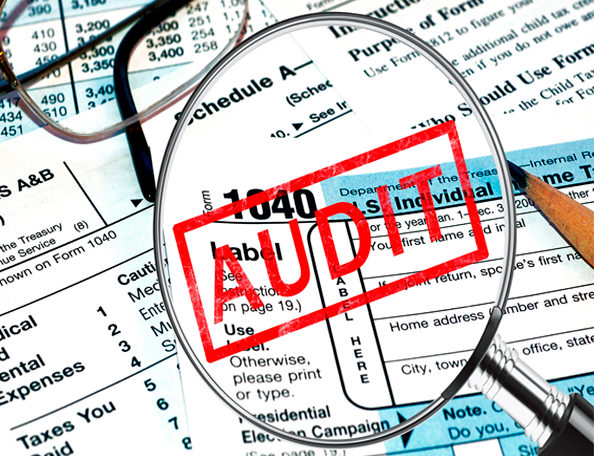Lawn Care Business Tax Audit: Find out if your business is ready!
What happens if one day you go to your mail box and pick up an envelope addressed to you with a return address from The U.S. Treasury – Internal Revenue Service stamped “Official Business.” Nothing strikes an emotional chord with small business owners like the prospect of a tax audit.
Obviously if you practice accurate bookkeeping in your business and obey the tax laws there is little to worry about. It’s now just a matter of proving that your company is in compliance. While the audit process may be intrusive it is within the IRS’s right to perform an audit of your tax returns. So as upset as you may be, you always want to be respectful to the auditor. Creating confrontation between you and the auditor is always a bad idea.
With respect to a field taudit, your best course of action is to contact your tax preparer. If your return was prepared by someone other than a licensed Public Accountant, a CPA, or an Enrolled Agent you should contact one of the aforementioned to find out the best way to proceed. It is not a good idea to have a face to face meeting with an IRS auditor without professional representation and the above professionals are trained in audit process and procedure. Tax laws can be complex and a carefully planned audit strategy may save you much more in potential additional taxes, penalties and interest than the professional fees paid to handle the audit.
The anatomy of an income tax audit starts with a sample period where the auditor will test the books and records to determine if they match the source documents prepared by third parties such as bank statements, cancelled checks, wire advice documents, loan documents, vendor invoices, etc. He may also request a reconciliation of amounts reported on sales tax or payroll tax returns to the amounts recorded on your books and ultimately reported on your income tax return. The sample period is usually a month or several months. If the auditor finds exceptions in the sample such as unrecorded cash, or improper expenses that are material, or gross revenues reported on sales tax returns that don’t match those reported on the books and records, he will expand the sample size to include several or all months covered by the return.
When exceptions are found, the auditor also has the right to audit all tax returns open under the statute of limitations (for IRS purposes three years, unless there is gross negligence or fraud which can be several additional years). If the audit is expanded in this manner, be prepared to have at least three years of returns examined. This is where professional tax representation is extremely important to the Land Care company owner as the tax professional will create or organize all schedules and reconciliations showing that all revenue and expense items trace and agree to the tax return and if not he will document the reasons for departure. Based on the professional’s experience he will also anticipate which items create tax exposure and come up with a plan for dealing with them.
Be Prepared for a Tax Audit!
Based on my experience with tax audits for Land Care professionals most accounts will be tested but the following items will be looked at most in depth by the auditor:
1. Revenues – Essentially the auditor will be looking for evidence that all your sales are properly recorded and do so through sales records that trace and agree to your bank statements and reasons for any departures.
2. Employee Compensation – Compensation must trace and agree to payroll records including forms 941s, 940s, W-2 and W-3s that are filed either by yourself or by your payroll company.
3. Outside Contactor’s Expense – If you use outside contractors, you will need to show invoices, checks issued, 1099s issued as well as proof that the subcontractors are in fact subcontractors and not W-2 employees. The 1099 versus W-2 issue is subtle but extremely important because if in the auditor’s opinion, the subcontractor is in reality an employee you may be subject to employment taxes.
4. Professional Fees – An auditor will again look for invoices, checks issued and 1099’s issued for the same reason in (3) above proving that you did in fact hire a professional rather than calling someone on your staff a professional and paying him without remitting payroll taxes.
5. Travel, Meals and Entertainment – Calendars, diaries, appointment books and logs should be kept documenting any legitimate expense as this is one of the most abused deductions and without such evidence an auditor may disallow the entire deduction.
6. Office Expense – You should have receipts, cancelled checks, credit card statements to substantiate office expenses. Many times auditors may look for large furniture and fixtures that were improperly expensed and should have been capitalized and depreciated over several years.
7. Other Miscellaneous Expense – For most companies this is a dumping account for expenditures that cannot be categorized easily. If you have a Miscellaneous Expense account make sure the items in it are legitimate deductible expenses.
The most important thing you can do is come prepared and be organized in category and chronology. This will build credibility with the auditor as well as make his or her job easier. While it’s no guarantee of a favorable outcome, it’s just human nature to respond more favorably to those who make things easier and it is no different with an auditor.
Only volunteer what is asked for and nothing more as providing too much information will result in additional work by the auditor who you are trying to move quickly through the audit process with as little pain to you as well as a minimum amount of work performed by him as well.
Looking for more information? Contact Turf Books!
